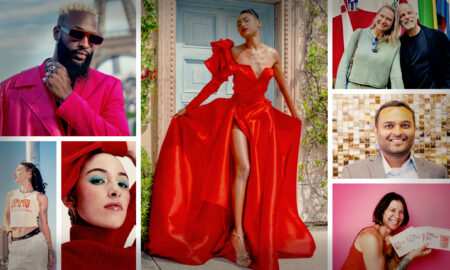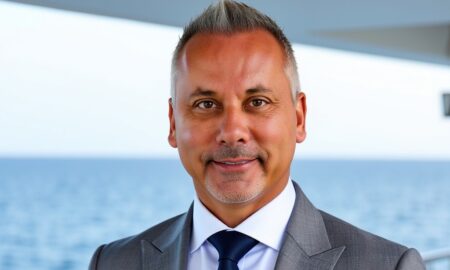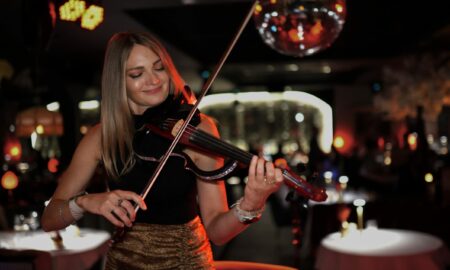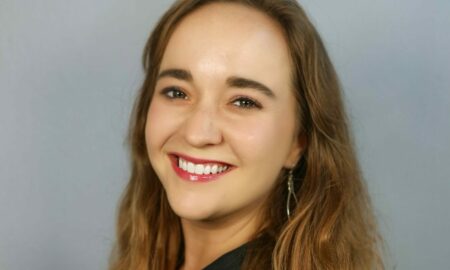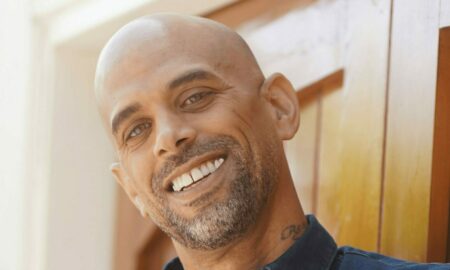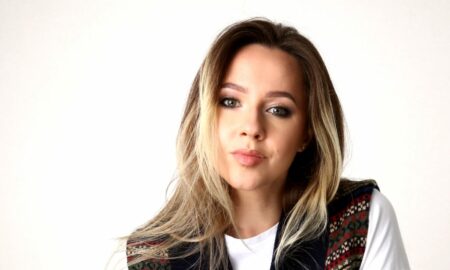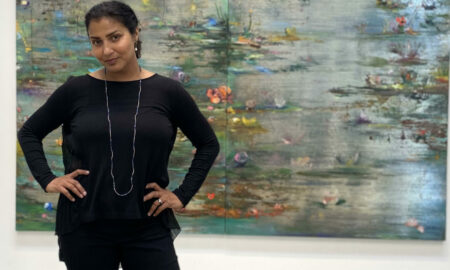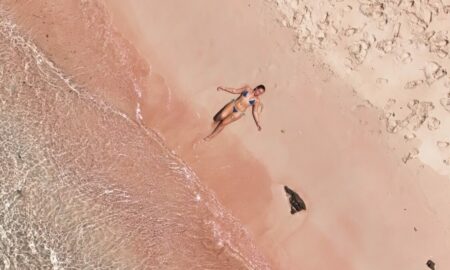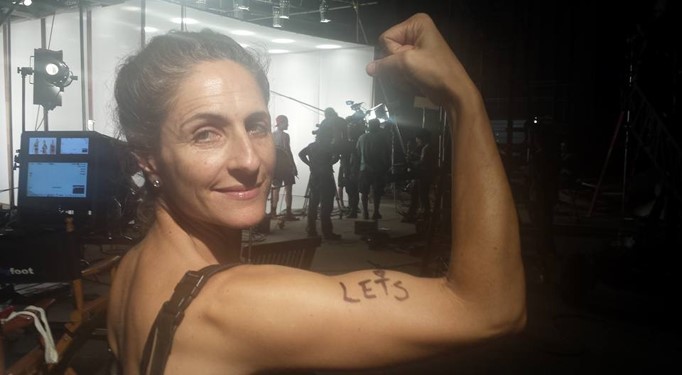

Today we’d like to introduce you to Monique Sorgen.
Monique, can you briefly walk us through your story – how you started and how you got to where you are today.
I grew up in a hippie house where creativity was smiled upon, and I was told that I could do or be anything I wanted to do or be. That’s why I decided that life and work should be fun. I loved telling stories– especially the ones with happy endings where everyone gets what they want in the end– so I came to L.A. to study acting at UCLA. While I was there, I realized two things: 1) that the actors don’t get to make up the stories, and 2) that I hated acting. While I didn’t like rehearsing for my acting classes, I found that I loved going to rehearsals for my directing classes (and everybody else’s). That was how I realized that I wanted to direct. When I couldn’t find any material I liked enough to direct it, I decided to write my own. That was how I learned that it’s the writer who gets to make up the stories. Kind of a roundabout way to get where I was going, but also, exactly what going to college and experimenting with things is for.
My thesis play was so well received that I was given an opportunity to be an assistant director on a multi-media play starring Laura San Giacomo. On the first day, the director gave me a ridiculously long list of crew she would need to accomplish both the stage elements and the filmed elements of the play. On the second day, I asked her if she was available to have a production meeting with all the crew I’d gathered for her. She was so impressed with my ability to get everything on her list done overnight, that she asked me to be her assistant. It turned out she was a television director, and her agent had just gotten her a job directing “Star Trek: Deep Space Nine”… So for the next three years, I got my “grad school” education by following her from set to set on network television dramas, space dramas, and comedies. I got her coffee and did her shot lists, and in the process, I learned all about being on a professional set and directing for the camera.
I made my first short film, with actors and crew from the sets I’d worked on, and it got international distribution and played on TV and airplanes around the world. I was 25. I thought life was gonna be easy for me. Then things got hard… Making the transition from being an assistant to being taken seriously as an above the line creative is never as easy as it looks. You often have to take risks, and you don’t know if those risks are gonna pan out. I quit my job to rebrand myself as a director (instead of an assistant), but I couldn’t get my feature financed, and it was several years before I got hired off my short film, and even then it was as a writer, not as a director. Plus, reality TV was just taking off, and those were the only jobs going, so before I knew it, I was pigeon holed as a “reality writer.” It didn’t suck getting paid to be creative, but it wasn’t what I’d set out to do, so after a few successful years working my way up to being in a creative think tank a ABC, and selling a few concepts for my own shows to all the big reality producers (none of which ended up getting made), I took another risk, and quit reality to rebrand myself as a feature film writer.
I was hired to write a few films, and I sold a movie I’d written to the USA Network, and developed movies with executives at DiNovi, Imagine, and other production companies that only entertainment industry people would have heard of. At some point, whether or not a movie would get made always seemed to come down to the question of who was going to direct it. Directors are very busy– partly because every time they commit to a movie it takes up at least a year of their life– so what happens is they take a long time to read a movie, and usually don’t end up reading it at all… On the bright side, I’m a director, and if I could convince a few actors to work with me, I could answer the question of “Who is going to direct this movie?” with “Me!” So enter phase four of this circuitous route to how I got where I am.
I started directing everything I could get my hands on. I made music videos that ended up on the Disney channel, and web series pilots that went into development at Lisa Kudrow’s company, and reality shows that shot on tropical islands in the Philippines, until I was ready to make my best film to date, “Sorry, Not Sorry,” which is currently on the festival circuit. It’s inspired by the famous William Carlos Williams poem, “This is Just to Say,” and stars Wallace Langham of “CSI,” and Jessica Oyelowo of “A United Kingdom,” and M. Emmet Walsh of “Blade Runner” (and about 200 other remarkable films). I was so impressed with Jessica’s performance that we are now developing my feature film, “Bad BFF,” for her to star in and me to direct through her company Yoruba Saxon. Separately, I also have a feature film version of my novel “How Long You Should Wait to Have Sex” in development, as well as a TV show about my childhood growing up in the hippie house.
Great, so let’s dig a little deeper into the story – has it been an easy path overall and if not, what were the challenges you’ve had to overcome?
I don’t think show business is a smooth road for anyone. The work is fulfilling, but the fight to get the work is not. Then usually once you have the work, you’re fighting all the compromises you’re being asked to make to the integrity of your vision, and at the same time trying not to get fired for not being flexible enough. Finding the balance between being creatively flexible and making sure the project is still great is one of the biggest challenges anyone who enters this business as a creative will have to face. People at even the highest levels are struggling with someone who doesn’t get what they’re trying to do but holds the purse strings. Those are the struggles for everyone.
On a personal level, as a woman, I was facing struggles I didn’t even know I was facing until I looked back on it with some retrospect. I didn’t realize that I was being looked at differently. I modeled the successful male behavior I saw around me and emulated it, but it never landed the same way. I was seen as ambitious and opinionated and overly confident, and people didn’t get it or like it. So, after a while, I tried being more demure, and then people didn’t trust me to do the work well or know anything at all. Either way, they didn’t trust me, and I never understood why. I knew I was perfectly capable, and it seemed obvious to me that other people should be able to see that too.
Ultimately, I think the most damaging way in which I was held back by my gender was that when I was networking, or connecting with people, or hanging out trying to be “one of the guys,” many of the guys often tried to turn it into a dating opportunity. In a business of “who you know,” being hit on makes it really hard to keep knowing people. If you sleep with someone they’ll see you as the girl they slept with, and if you don’t sleep with someone they’ll see you as the girl they didn’t sleep with, and either way, they don’t really want to work with you. I’m glad we’re finally having the conversation about this now as a society and as a business because for years I just had to giggle and act like I hadn’t noticed how wrong it was. It’s such a relief to be able to say it out loud, and feel like people actually hear you.
We’d love to hear more about what you do.
As a writer-director, I like to tell stories that focus on the woman’s experience from a comedic point of view. After a career of being asked to make my main characters men, and write from the point of view of a man, I’ve just realized how many of my own stories have never been told. Women are funny. We also have funny experiences and bodily functions. I just know that the more stories we get out there about real women doing real things with real personalities, the more we will be accepted as a people– flaws and all. A lot of things are just different when you go through life as a woman, and somehow, those things are not common knowledge to some men. That’s just bizarre to me.
I think a lot of us women are getting out there and trying to shine a light on our stories, but what sets me apart is my experience, my life history, and my voice– which comes from my ability to see things as they really are. I don’t sugar coat things for myself, so when I make observations, people often realize that it was something they were thinking on some level, but never really materialized into a solid thought. Once I say the thing, people are like, “Yeah… that’s so true. Why don’t we talk about that stuff?” I’m also kind of analytical, so I think I bring a lot of logic to my arguments, and in a script, you really have to look at both sides in order to have good conflict. I’m also really hard on myself, so I hold my work to high standard and don’t make excuses for it just because I want to be done.
Do you look back particularly fondly on any memories from childhood?
I had a really fun childhood, growing up in a party house in San Francisco, so it’s hard to pick a favorite memory, but the first thing that comes to mind is spin the bottle… which is ironic, because I really didn’t like kissing people when I was 11 and we were playing that. But the adrenaline was unmatched! I remember the anticipation of seeing who the bottle would land on. It’s such a gamble– at any moment you could end up kissing a person you’re crushing on or a person who repulses you and has bad breath.
Contact Info:
- Website: www.moniquesorgen.com
- Instagram: https://www.instagram.com/moniquesorgen/
- Facebook: https://www.facebook.com/moniquesorgenlove/
- Twitter: https://twitter.com/moniquesorgen
- Other: https://www.amazon.com/How-Long-Should-Wait-Have-ebook/dp/B00CCH4VIQ






Getting in touch: VoyageLA is built on recommendations from the community; it’s how we uncover hidden gems, so if you know someone who deserves recognition please let us know here.

